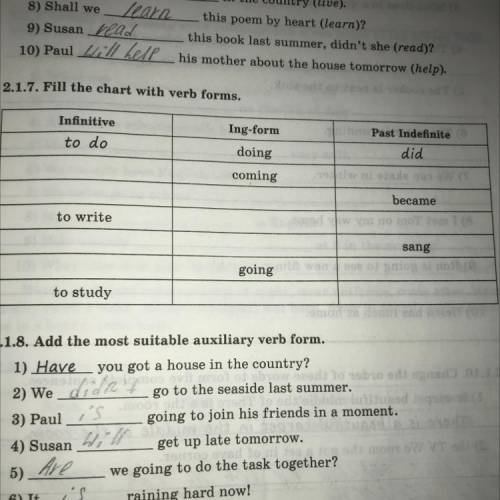10) Paul his mother about the house tomorrow (help).
2.1.7. Fill the chart with verb forms.
Infinitive
to do
Past Indefinite
did
Ing-form
doing
coming
became
to write
sang
going
to study
most suitable auxiliary verb form.

Другие вопросы по теме Английский язык
Популярные вопросы
- Купили 7 билетов в кино и 5 билетов в театр,сколько всего билетов купили?...
3 - Как звали царя в сказке снегурочка и почему?...
1 - Выпишите предложения в следующем порядке: 1) простые предложения: 2)...
2 - Выполниите действия (5/8-2/5)+3/20 1/8+(5/9-1/4)...
1 - Answer the following questions. 21. what does the term “constitution”...
2 - Пересказ этого текста ну только чтоб текст был коротким. it is said that...
2 - Овцы блеют (блеять).вороны волки собаки сороки петухи куры лошади кто...
2 - Скажите 6 собственно слов тематической группы дом...
3 - Обуть,обагрить,обогнать,обузить,обеднеть,обогреть,обежать в каких словах...
1 - От какого слова образовалось слово пшеничный ? (пшено/пшеница)...
3
Infinitive: to help
Past Indefinite: helped
Ing-form: helping
most suitable auxiliary verb form: will
Explanation:
In the given sentence, we need to choose the appropriate verb forms for the verb "help" to complete the sentence correctly.
First, let's identify the base form or infinitive of the verb, which is "to help".
Next, we need to find the past indefinite form of the verb, which is "helped".
Then, we find the ing-form or present participle of the verb, which is "helping".
Finally, we have to choose the most suitable auxiliary verb form to complete the sentence. In this case, the sentence is talking about a future action, so the auxiliary verb "will" is the most suitable choice.
Therefore, the correct sentence is "Paul will help his mother about the house tomorrow."